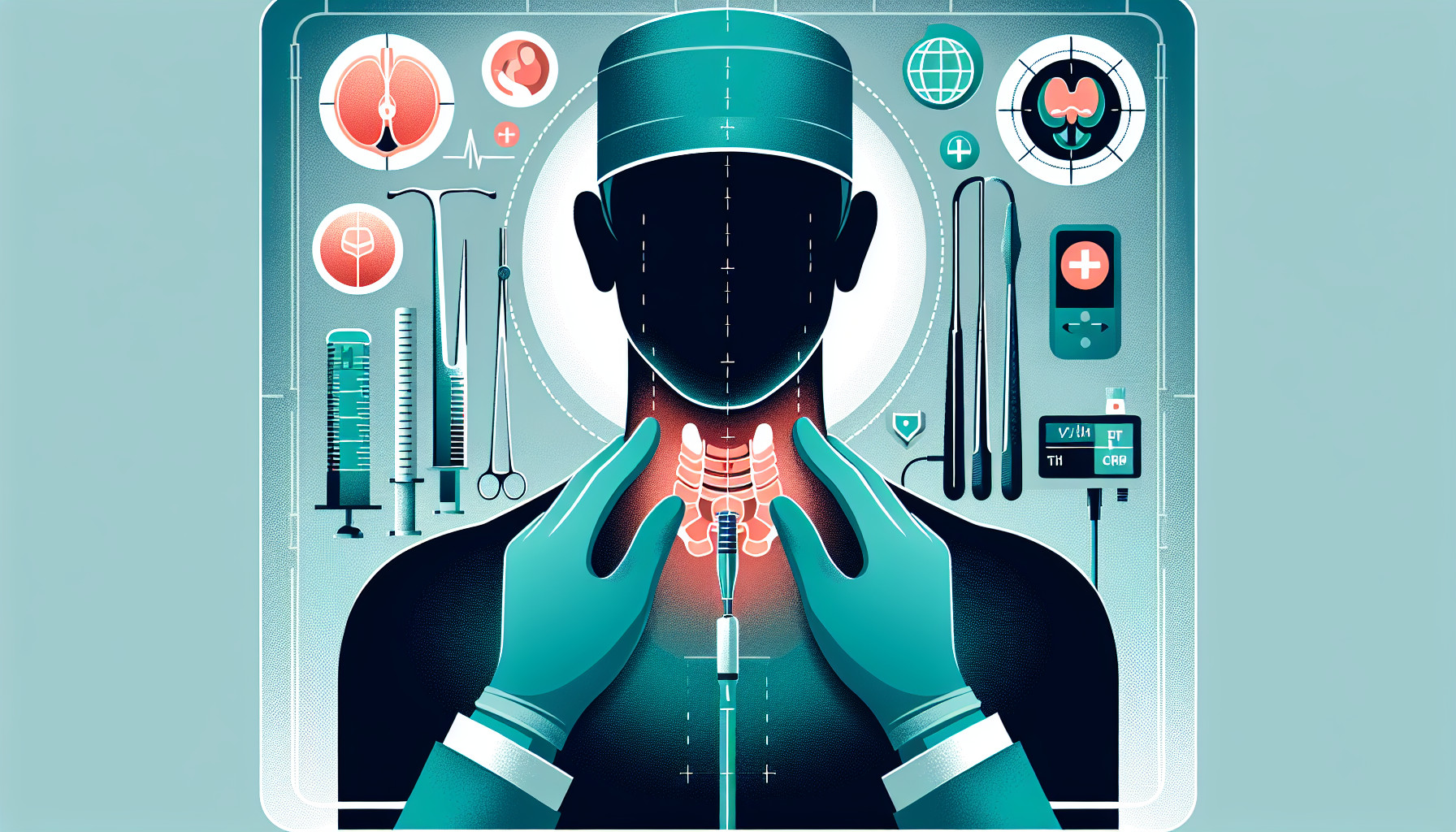Our Summary
This research paper investigates how often a person’s parathyroid glands are accidentally removed during thyroid surgery. The parathyroid glands are small glands in the neck that control the body’s calcium levels. If they are accidentally removed during surgery, it can lead to low calcium levels, a condition known as hypoparathyroidism.
The research was conducted in Romania and involved over 3,000 patients who had thyroid surgery between 2005 and 2014. The researchers found that accidental parathyroid gland removal happened in about 15% of the surgeries. Most of the time, only one gland was removed by accident.
The chances of accidental removal were higher in certain types of surgeries, especially total or near-total removal of the thyroid gland. Reinterventions or surgeries to remove remaining thyroid tissue also had a higher risk of accidental parathyroid removal.
The researchers conclude that accidental removal of the parathyroid glands is not rare and happens even with experienced surgeons. It was found to be more common in female patients with multiple nodules on their thyroid gland. The researchers also found that a person’s age or whether they had inflammation of the thyroid gland did not significantly affect the chances of accidental parathyroid removal.
FAQs
- How often are parathyroid glands accidentally removed during thyroid surgery according to the research?
- What are the consequences of accidental parathyroid gland removal during thyroid surgery?
- Are there certain types of surgeries or patient conditions that increase the risk of accidental parathyroid gland removal?
Doctor’s Tip
A helpful tip a doctor might tell a patient about parathyroidectomy is to discuss the risks and potential complications with their surgeon beforehand. It is important for the patient to understand the possibility of accidental parathyroid gland removal and how it can affect their calcium levels post-surgery. Patients should also be aware of the symptoms of low calcium levels, such as muscle cramps, tingling in the hands and feet, and changes in mental status, so they can seek prompt medical attention if needed. It is crucial for patients to follow their surgeon’s post-operative instructions closely to minimize the risk of complications and ensure a successful recovery.
Suitable For
Patients who are at a higher risk for accidental parathyroidectomy during thyroid surgery include those undergoing total or near-total thyroidectomy, reinterventions, and those with multiple nodules on their thyroid gland. Female patients are also more likely to experience accidental parathyroid removal. It is important for surgeons to be aware of this risk and take precautions during surgery to avoid damaging the parathyroid glands. Additionally, patients who have had accidental parathyroidectomy may require close monitoring and potentially need treatment for hypoparathyroidism.
Timeline
Before parathyroidectomy:
- Patient undergoes thyroid surgery.
- Accidental removal of parathyroid glands may occur during thyroid surgery.
- Symptoms of low calcium levels, such as muscle cramps, tingling sensations, and fatigue, may develop.
After parathyroidectomy:
- Patient may experience symptoms of hypoparathyroidism, such as muscle cramps, tingling sensations, and fatigue.
- Blood tests are conducted to monitor calcium levels.
- Calcium and vitamin D supplements may be prescribed to manage low calcium levels.
- Patient may need to follow up with their healthcare provider regularly to monitor calcium levels and adjust medication as needed.
What to Ask Your Doctor
- What is the purpose of a parathyroidectomy and why is it necessary in my case?
- What are the potential risks and complications of a parathyroidectomy, including the possibility of accidental parathyroid gland removal?
- How experienced are you in performing parathyroidectomies and what is your success rate?
- What measures will be taken to prevent accidental parathyroid gland removal during the surgery?
- How will my calcium levels be monitored post-surgery and what steps will be taken if they become too low?
- What is the recovery process like after a parathyroidectomy and how long will it take for me to fully recover?
- Are there any long-term effects or complications that I should be aware of after having a parathyroidectomy?
- Will I need to take any medications or make any lifestyle changes after the surgery to manage my calcium levels?
- Are there any alternative treatments or procedures that I should consider before deciding to have a parathyroidectomy?
- How often will I need follow-up appointments to monitor my calcium levels and overall health after the surgery?
Reference
Authors: Marian D, Scurtu GA, Fulop RL, Fulop ZZ, Andercou O. Journal: Ann Ital Chir. 2023;94:240-244. PMID: 37530038
